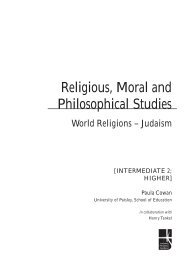PDF file: History - Advanced Higher - Germany - Education Scotland
PDF file: History - Advanced Higher - Germany - Education Scotland
PDF file: History - Advanced Higher - Germany - Education Scotland
Create successful ePaper yourself
Turn your PDF publications into a flip-book with our unique Google optimized e-Paper software.
A quarter of an hour later I stood before the President … ‘You cannot possibly leave<br />
an old man like me in the lurch’ … Such a call, I felt transcended party obligations. I<br />
clasped the Field Marshal’s hand. Schleicher, who had been waiting in the next<br />
room, came in to offer his congratulations.<br />
Source G<br />
The pastoral letter of the Bishops in Prussia on the subject of the elections of 31 July,<br />
1932.<br />
The imminent elections of deputies to the German Reichstag are of great importance,<br />
not only in the political context but also on account of the influence of legislators and<br />
the Government on the promotion and protection of religious interests and the<br />
position of the Church in the life of the nation. This lays on all Catholic Christians<br />
the patriotic duty of exercising their vote in a manner befitting the responsibility of a<br />
true citizen and a faithful Catholic Christian.<br />
Vote for deputies whose character and attested attitude bear witness to their<br />
commitment to peace and social welfare, and to the protection of confessional<br />
schools, the Christian religion and the Catholic Church. Beware of agitators and<br />
parties which are not worthy of the trust of the Catholic people.<br />
Source H<br />
Otto Meisner gives evidence to the Nuremberg Tribunal in 1946.<br />
Schleicher came to Hindenburg with a demand for emergency powers as a<br />
prerequisite of action against the Nazis. Furthermore, he believed it necessary to<br />
dissolve, and even temporarily eliminate, the Reichstag, and this was to be done by<br />
presidential decrees on the basis of Article 48 - the transformation of his government<br />
into a military dictatorship … Schleicher first made these suggestions to Hindenburg<br />
in the middle of January 1933, but Hindenburg at once evinced grave doubts as to its<br />
constitutionality. In the meantime von Papen had returned to Berlin, and by<br />
arrangement with Hindenburg’s son had had several interviews with the President …<br />
Source I<br />
A Rhineland newspaper reports on the growing political crisis late January 1933.<br />
Reich Chancellor von Schleicher today informed the Reich President…that the<br />
present national government would be unable to defend itself vis a vis the Reichstag if<br />
it did not obtain in advance the power to dissolve parliament. Reich President von<br />
Hindenburg stated that he could not grant this proposal because of current<br />
conditions. Reich Chancellor von Schleicher then announced the resignation of the<br />
government … Reich President von Hindenburg summoned former Chancellor von<br />
Papen and requested him to clarify the political situation and to suggest possible<br />
procedures.<br />
<strong>History</strong>: <strong>Germany</strong>: Versailles to the Outbreak of World War II - 1918-1939 (AH) 65
















